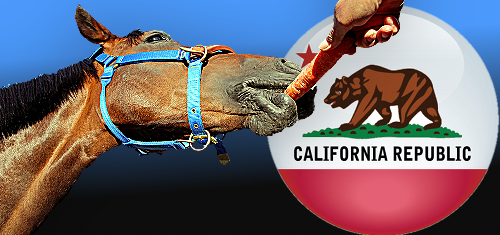 California’s font online poker regulatory hopes showed flickers of life this week following the release of new draft legislation and a meeting of key tribal gaming groups.
California’s font online poker regulatory hopes showed flickers of life this week following the release of new draft legislation and a meeting of key tribal gaming groups.
Late last month, California Assemblyman Adam Gray filed amendments to his AB 431 online poker legislation that would offer state racetracks up to $60m in annual payments in exchange for giving up the opportunity to be an active participant in the state’s proposed regulated online poker market.
AB 431, which until last month had been a shell bill with little in the way of detail, now specifies a 15% tax rate for online poker licensees, which would be limited to established tribal casinos and state card rooms. Licensees would have to ante up $15m deposits, from which future tax payments will be deducted. Licensees would be able to operate up to two online poker sites.
Gray’s plan calls for the tracks to receive the first $60m of the state’s annual online poker revenue, 95% of which would go toward racing purses and pari-mutuel employee retirement plans, while the other 5% would support state agricultural fairs.
The bill has been deemed an urgency statute, meaning it will require a two-thirds favorable vote in both of the state’s legislative chambers. Assuming that happens, the state would have 270 days following passage in which to craft the necessary regulations.
I WAS TOLD THERE WOULD BE NO MATH
The tracks’ desire to add online poker to their existing advance deposit wagering sites has been fiercely opposed by the state’s tribal gaming industry, which maintains that the tracks have never offered poker in any form and to do so now would violate the exclusivity provisions of tribal-state gaming compacts.
On Thursday, Gray convened a meeting of tribal leaders in the hopes of garnering support for his plan. Longtime tribal gaming reporter Dave Palermo’s recap of Gray’s meeting indicated some tribes came away thinking they’d made progress while others felt they were no further ahead.
A representative of the tribes that have inked a partnership with Amaya Gaming’s PokerStars brand said they had “agreed not to oppose” AB 431 although California Nations Indian Gaming Association (CNIGA) chairman Steve Stallings expressed concern that the financial provisions of Gray’s bill would have to be “rolled back.”
Stalling maintains that the expenses associated with launching the state’s poker market will make the sites unprofitable for the first four years, meaning “there’s not going to be any income to tax.” Despite his support for Gray’s efforts to buy off the tracks, Stallings believes “the total economics of the bill don’t work.”
This latter sentiment was echoed by the tribal coalition that has historically been the biggest barrier to online poker legislative progress. David Quintana, a lobbyist representing tribes led by the Pechanga Band of Luiseño Indians, expressed his belief that AB 431’s figures “aren’t real world.”
But Quintana rejected suggestions that the Pechanga coalition had given up its opposition to ‘bad actors’ like PokerStars participating in the state’s online poker market. Quintana said the Pechanga coalition would insist that the matter be resolved before the bill came up for a vote on the Assembly floor.
It remains to be seen whether the tracks will accept Gray’s bribe. Just prior to Gray’s meeting, Assemblyman Mike Gatto told PokerNews that he put the odds of California passing online poker legislation in 2016 at less than 10%. Gatto, who filed his own poker bill last year, said stakeholders were “too focused on their own power politics or egos to come together.”
